Immigration is a highly sensitive topic. As advanced economies have failed to increase productivity and living standards at the same pace as during the late 20th century, the politics around migration has become even more challenging. With wage stagnation, surging house prices, and strained public infrastructure, some pushback against migration has almost become inevitable, which is exactly why the U.K. government is aggressively tightening legal migration.
Nevertheless, adverse demographic developments in many advanced economies will require a larger inflow of workers in the future.
In this article, we aim to inform readers so that the discussion about migration inflows to the U.K. can be based on facts instead of prejudices.
Fact #1: The U.K.’s foreign-born share is slightly higher than the OECD average
The U.K. has become one of the most popular destination countries for migrants in recent decades. The share of the foreign-born population has steadily increased from less than 10% in 2006 to about 14.5% in 2021.
While this number sounds relatively high (and is, surprisingly, larger than the U.S. figure), there are many other OECD economies that have an even higher share of inhabitants who are foreign-born, including Germany, Spain, and Sweden.
Australia and New Zealand stand out as extremely popular migration destinations with a foreign-born share of 26 and 29%, respectively.
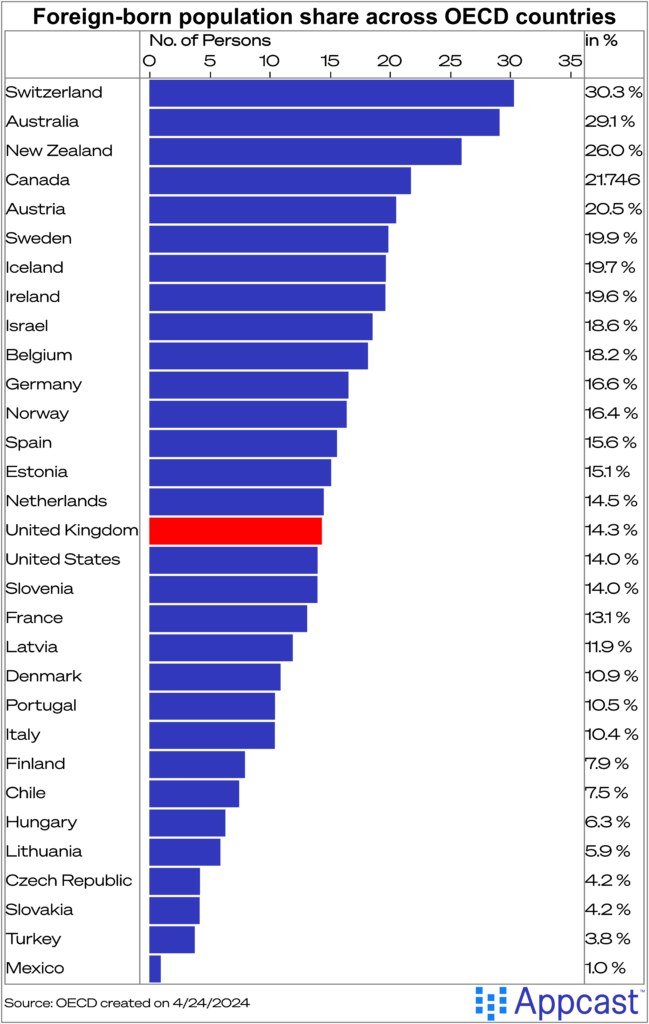
Fact #2: Net migration is up and changed from EU to non-EU migrants
Brexit has not just imposed large costs on the U.K. economy but also led to significant changes in migration patterns as free movement of workers between the EU and the U.K. has ended. While migration from the EU has been positive until about early 2021, over the last three years more people from the EU have left the U.K. than have arrived, leading to a net outflow.
Non-migration, on the other hand, has surged and reached a record-high of more than 750,000 between Q2 of 2022 and Q2 of 2023.
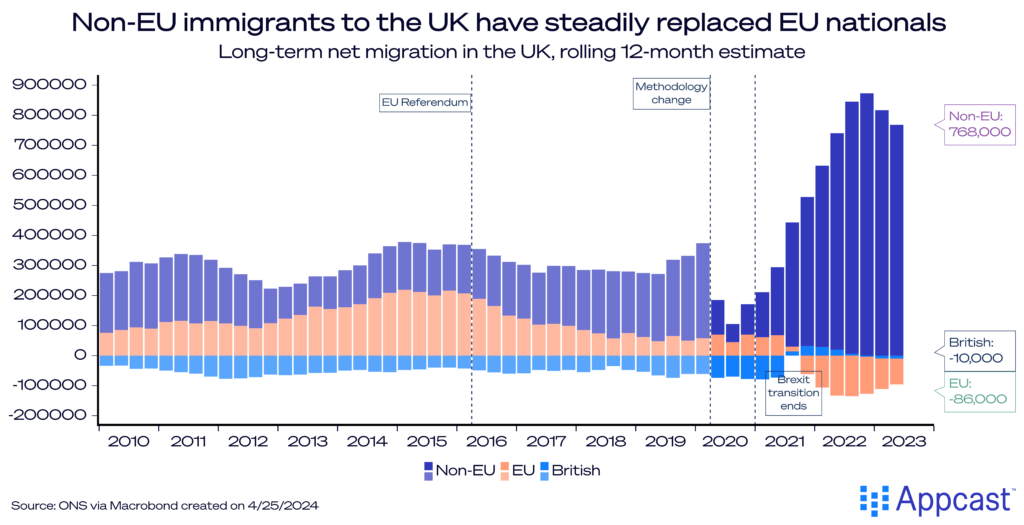
Unsurprisingly, former U.K. colonies India and Pakistan are among the top ten countries of birth among migrants. Eastern European countries Poland and Romania as well as Ireland and Germany also rank highly.
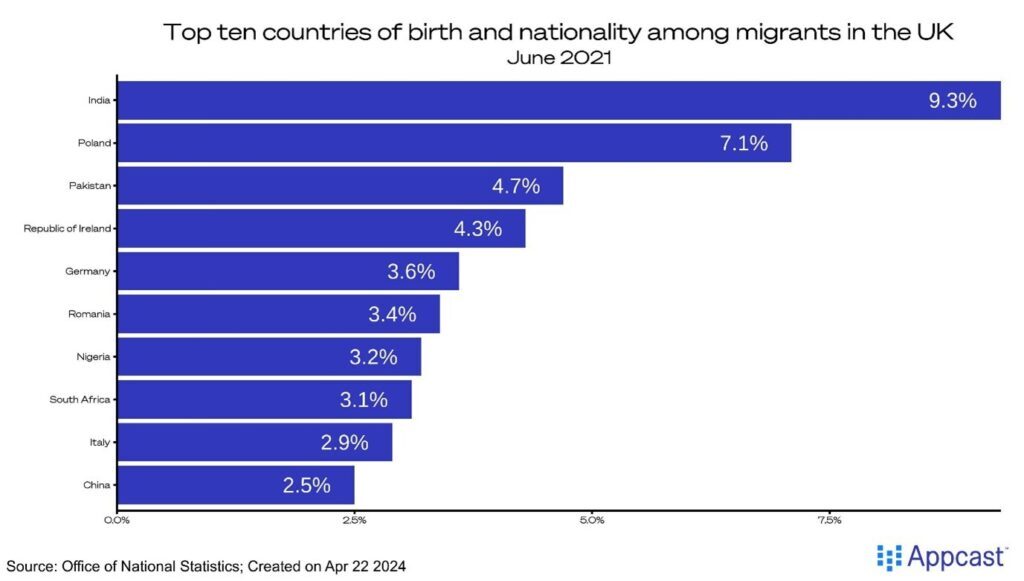
Fact #3: The UK government is aggressively toughening visa restrictions
The U.K. government just published a report earlier this year that explains various actions it is taking to reduce legal migration. This policy announcement is surely addressing concerned voters ahead of the next general election.
Some of the key measures that the government is taking include the following:
- Restricting care workers and students to bring dependents along
- Increasing the minimum salary threshold by nearly 50% from its current position of £26,200 to £38,700 from 4 April 2024. The latter figure is slightly higher than the 70th percentile in the UK earnings distribution.
- For UK citizens, the income required for a family visa is raised in incremental stages to the £38,700 by 2025, meaning that most U.K. workers will not be eligible anymore to bring a foreign spouse into the country.
- The Shortage Occupation List will be “reformed”, the specifics around tougher restrictions are yet to be determined.
Fact #4: Labor market outcomes for migrants in the UK are generally good
Labor market outcomes for migrants are generally good in the U.K. Economies within the Anglosphere in general score very highly on this front and employment outcomes for migrants even exceed those of natives. In the U.K., the employment rate for EU migrants is now close to seven percentage points higher than that of natives. For non-EU migrants, it is still slightly below, but the gap has narrowed substantially over the last decades. Moreover, a substantial share of non-EU migrants are students in the U.K. and therefore a lower employment rate is to be expected.
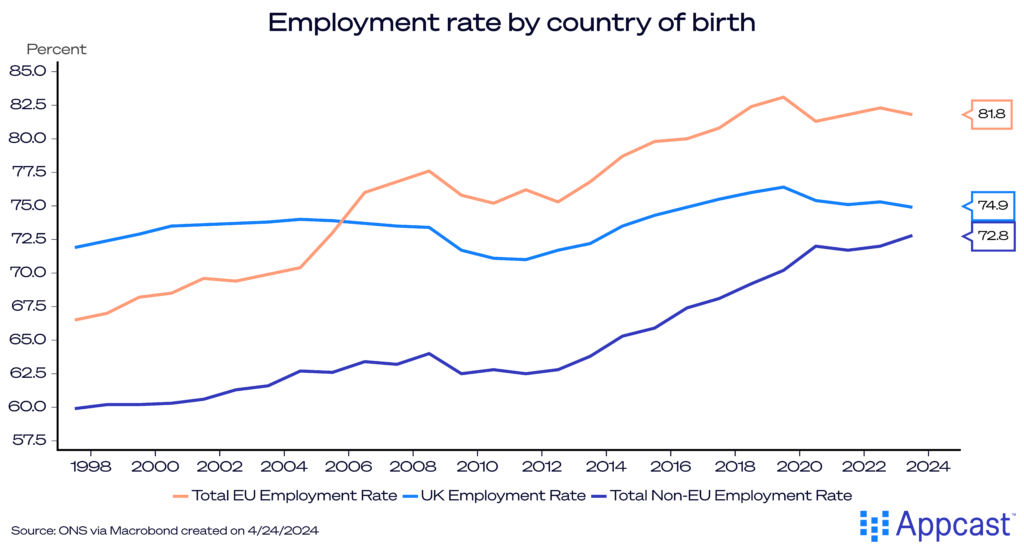
Migrant workers are making up the largest share of the workforce for both very skilled and more unskilled jobs. Finance and IT are two sectors that are predominantly white-collar. and the share of non-UK workers is 21% and 27%, respectively.
Conversely, the share of non-UK workers is also extremely high in sectors that with mostly blue-collar jobs, such as hospitality (27%), transportation and storage (27%), and health and care (22%).
Public administration, education, and construction have the lowest share of non-UK workers.
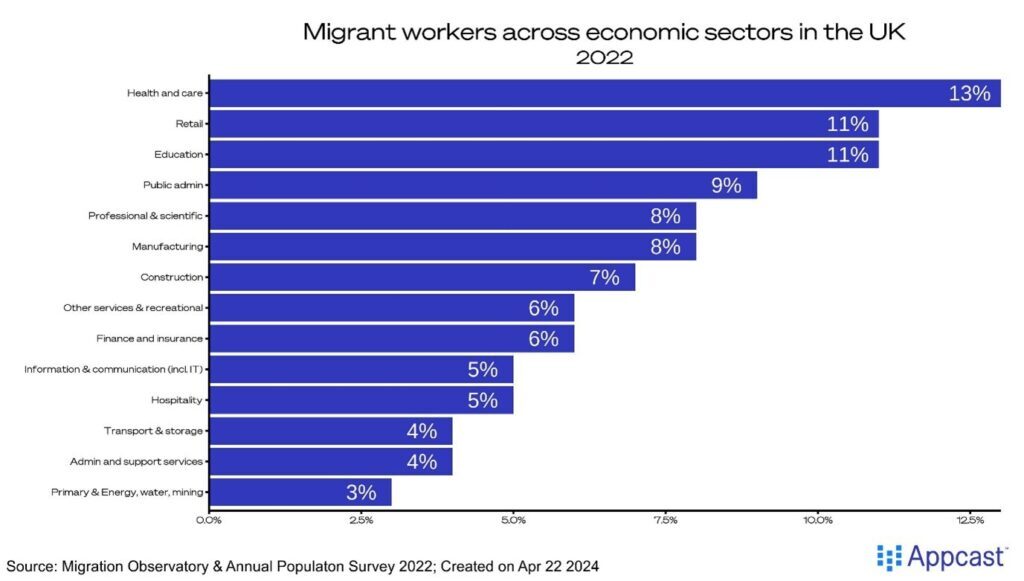
Fact #5: The distribution of migrants is highly uneven throughout the UK
The distribution of migrants within the U.K. is highly uneven. Unsurprisingly, most migrant workers are attracted to London and the Southeast since London’s population is the most diverse and employment opportunities and wages are better. The existence of large foreign diasporas helps to attract more people from abroad as well.
Birmingham and Manchester are two other large cities that are quite diverse, which is why the Midlands and the North West also have a comparatively high migrant share.
Wales and the North East stand out as having the lowest share of immigrants. These regions also have lower income levels relative to the rest of the country, which can help explain why less people from abroad consider moving there.
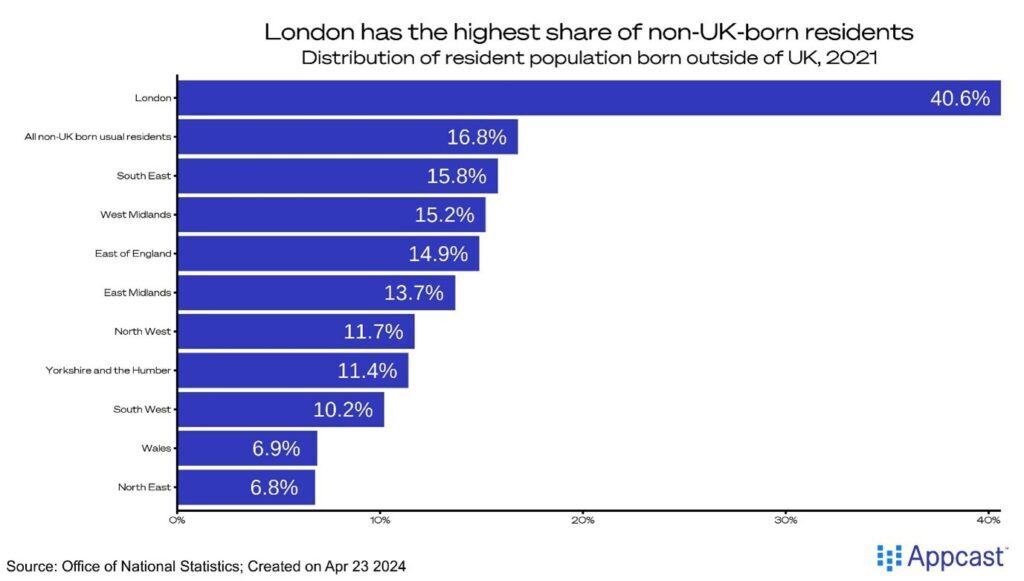
Fact #6: The UK’s economy has been growing thanks to migration
The U.K. economy has been relatively stagnant since the Global Financial Crisis. While total GDP is more than 20% higher than in 2010, per capita incomes are only about 10% higher since then. So more than half of the economic growth has been a result of population growth – positive net migration – instead of productivity growth.
While the U.K. should care to some extent about whether the economy as a whole is growing or not, what ultimately matters for people is living standards and per capita income. From that perspective, the country has been performing extremely poorly for various reasons. Suffice to say that austerity and a lack of public infrastructure investment combined with a dysfunctional housing market are likely to blame.
Immigration, on the other hand, had nothing to do with the slowdown in income growth. On the contrary, research suggests that non-EU migrants have actually boosted U.K. productivity numbers. Prior to 2019, salaries for non-EU workers were higher than those for natives (and EU-workers) and therefore lead to rising average salary in the U.K.
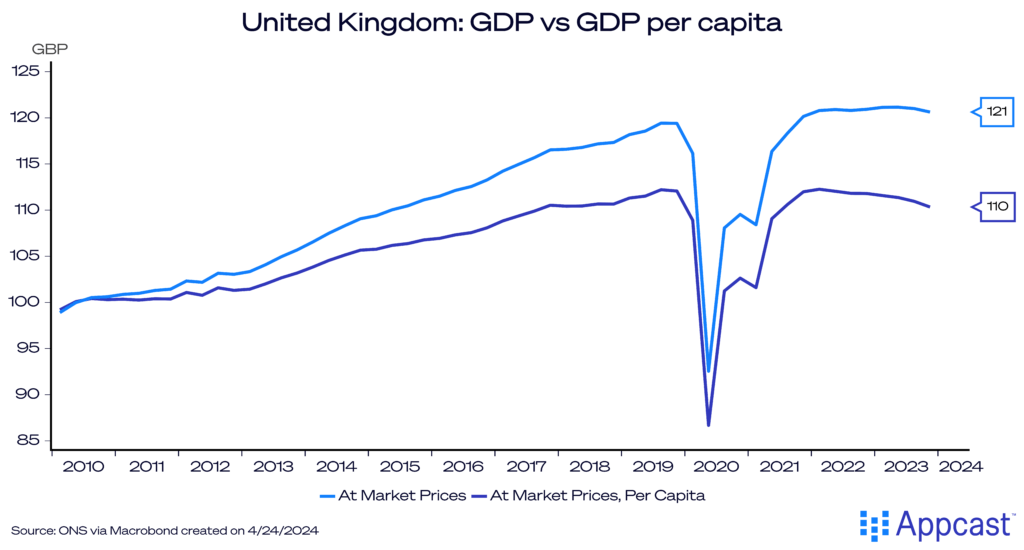
Fact #7: Migration is needed but also poses challenges that need to be addressed
While the U.K.’s population dynamics are more favorable than in many other advanced economies, this is mostly a function of high immigration since the early 2000s. Despite that, the U.K.’s population pyramid will shift significantly in the decades to come, with a substantial increase in the number of old-age workers and retirees and a stagnation (or even shrinkage) of young people.

And this, of course, means that the public pension system will become even more strained than it currently is. While higher migration inflows will require more public investment into infrastructure, the education system, and the housing market, advanced economies will have to make these investments for migration to work.
Conclusion
Net migration has surged to a record high in recent years and the share of workers from abroad is higher than at any time before. Immigration has become a super sensitive topic in the U.K., particularly as wages have been stagnant and housing costs are exploding. There is a general feeling that domestic workers are in competition with foreigners because necessary infrastructure investments that could accommodate a larger population have stalled.
Nevertheless, migration will be needed as the aging population will strain future pension systems. Brexit has led to a shortage of workers in some key sectors, including healthcare and hospitality. In the grander scheme of things, immigration is a big plus for the U.K. economy, but it would work substantially better for everybody if public investments were to keep up with what is required.







